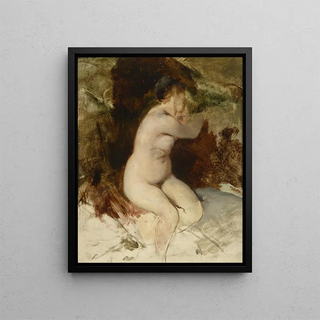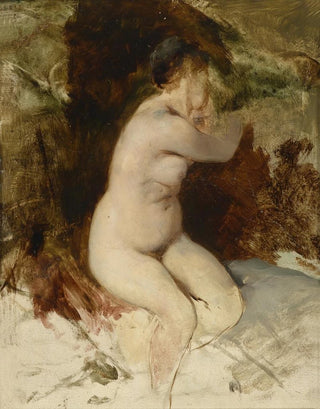Art print | Study of the nude - Friedrich August von Kaulbach


View from behind

Frame (optional)
Friedrich August von Kaulbach's "Art print" of "Étude d'acte" stands as a true ode to the beauty of the human body, an exploration of forms and movements that transcends mere academic exercise. In this painting, the artist manages to capture the very essence of anatomy while infusing a poetic dimension into his study. Light plays across muscles and shadows, revealing Kaulbach's technical mastery, while inviting the viewer to contemplate the grace and fragility of the human figure. This piece, both technical and expressive, is not limited to a simple drawing; it becomes a dialogue between the artist and his subject, an exchange where beauty reveals itself in every curve and detail.
Style and uniqueness of the work
Kaulbach's style is characterized by meticulous precision and palpable sensitivity. In "Art print" of "Étude d'acte," he moves away from rigid academic conventions to embrace a more free and intuitive approach. The lines, both delicate and assertive, sketch a body that appears both static and in motion, as if the artist succeeded in capturing a fleeting moment. This painting stands out through its bold use of light and shadow, creating a striking contrast that highlights musculature and skin texture. Every stroke is a tribute to human anatomy, but also to the intrinsic beauty that emanates from it. Kaulbach, like a true alchemist, transforms paper into a living scene, where each gaze upon the work reveals new nuances and interpretations.
The artist and his influence
Friedrich August von Kaulbach, an emblematic figure of the 19th century, knew how to mark his era with his innovative approach to painting and drawing. Raised in a rich artistic environment, he was influenced by the great masters of the Renaissance while developing a style unique to himself. His ability to combine academic rigor with artistic sensitivity made him a pioneer in portrait art and the depiction of the human body. Kaulbach's works, often imbued with a certain melancholy, testify

Matte finish

View from behind

Frame (optional)
Friedrich August von Kaulbach's "Art print" of "Étude d'acte" stands as a true ode to the beauty of the human body, an exploration of forms and movements that transcends mere academic exercise. In this painting, the artist manages to capture the very essence of anatomy while infusing a poetic dimension into his study. Light plays across muscles and shadows, revealing Kaulbach's technical mastery, while inviting the viewer to contemplate the grace and fragility of the human figure. This piece, both technical and expressive, is not limited to a simple drawing; it becomes a dialogue between the artist and his subject, an exchange where beauty reveals itself in every curve and detail.
Style and uniqueness of the work
Kaulbach's style is characterized by meticulous precision and palpable sensitivity. In "Art print" of "Étude d'acte," he moves away from rigid academic conventions to embrace a more free and intuitive approach. The lines, both delicate and assertive, sketch a body that appears both static and in motion, as if the artist succeeded in capturing a fleeting moment. This painting stands out through its bold use of light and shadow, creating a striking contrast that highlights musculature and skin texture. Every stroke is a tribute to human anatomy, but also to the intrinsic beauty that emanates from it. Kaulbach, like a true alchemist, transforms paper into a living scene, where each gaze upon the work reveals new nuances and interpretations.
The artist and his influence
Friedrich August von Kaulbach, an emblematic figure of the 19th century, knew how to mark his era with his innovative approach to painting and drawing. Raised in a rich artistic environment, he was influenced by the great masters of the Renaissance while developing a style unique to himself. His ability to combine academic rigor with artistic sensitivity made him a pioneer in portrait art and the depiction of the human body. Kaulbach's works, often imbued with a certain melancholy, testify






